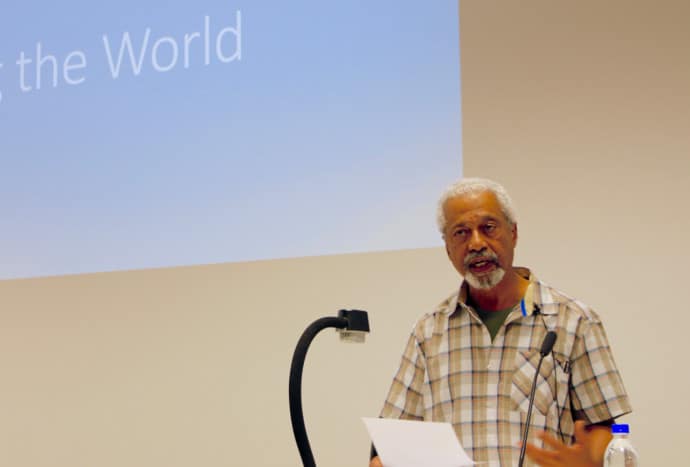“A South-South dialogue would disperse the source of critical and aesthetic concerns from the Eurocentric influence which colonial education and global dominance has made inescapable. It would promote and make possible the existence of a ‘south’ canon of equivalent value to the ‘north’, whose concerns will make reference to issues of interest to them and which may be of no relevance to the west,” said Abdulrazak Gurnah, Emeritus Professor of English and Postcolonial Literatures at the University of Kent who presented the second STIAS public lecture for 2018 with the title Reading the World.

“It might be said this already happens,” he continued, “but there is scope for development. Such an approach would have a stronger sense of the significance of the local, and would recognise the existence of multiple ‘worlds’ and centres of cosmopolitanisms. It would be a contradiction to speak of this as ‘world literature from the global south’ since it would not be global but the literature of the south, not singular or to the exclusion of any other categorisation. It would recognise the hubristic dimension of ‘world’ in the concept of ‘world literature’, whose limitations cannot avoid being parochial.”
Gurnah pointed out that historically the main way of conceiving ‘world literature’ has been as an openness in the west towards the literatures of the rest of the world.
“This conception assumes the centrality of the west and anticipates the world’s reciprocal openness towards it. This is a legacy of colonialism.”
He pointed out that early ideas of ‘world literature’ – a term first coined in 1827 by Goethe – had in mind as its main participants the French, English and Germans – “their texts, their critics and their cultural histories and was a Eurocentric conception which saw the possibility of enriching European literature by exposure to ‘the foreign’”.
It was about understanding the history and culture of other civilisations in the interests of Imperialist domination. The primary purpose was to benefit European knowledge.
It was about “raiding the cultural products of others, whose purpose was the enrichment of the self and of the national literature through a transaction with the foreign”.
He pointed that ‘world’ in this context simply meant European.
The subsequent growth of the area of study known as ‘world literature’ was supposedly about increased openness in the North towards the literatures of the rest of the world. “However,” asked Gurnah, “is it possible to conceive of ‘world literature’ without the centrality of the North?”
Gurnah questioned whether ‘world literature’ and the postcolonial approach to literature is not also a form of globalisation, where the term refers to the expansion of ‘western’ interests, despite the existence of a better informed and contesting international culture. “Are they both forms of globalisation,” he asked, “if we take this to be a process of constructing a ‘global’ discourse of non-western writing and the representation of its cultures and societies?”
“Both ‘world literature’ and the postcolonial approach share a reductive tendency towards diminishing the significance of the local, towards homogenising actual experience, towards obscuring the question of what is self and what is other. We have to ask how is the local to transcend its local constraints?”
“I believe that taking account of the local means allowing for different perspectives, and anticipating that the idea of what constitutes the cosmopolitan will change,” he continued. “We have to move away from universalising and towards the recognition of difference.”
“In short, it is possible that the idea of ‘world literature’ is made obsolete once we dismantle its Eurocentric structure.”
“The term is perhaps now contradictory because we are really talking about literature from the South. There is a contradiction in the assumption that you can retain the notion of ‘world literature’ and then still have something that is not ‘world literature’ – why bother, why not just call it ‘literature from the South’.”
“I believe it is conceivable as some kind of depoliticised, post-colonial literature that can deal with issues without raising all the nasty things about colonialism in a big way.”
In discussion, he addressed the issue of language. “Language depends on the realities of the local,” he said. “Unfortunately though, languages are not always viable because of the small numbers of people who speak them and because of political realities. Whether we like it or not, some languages dominate and become the languages of writing, science and education. It’s not necessarily a question of being efficacious, it’s just political reality. If you are the reader or writer of a smaller language your language is probably going to be marginalised. However, there is also the important place of translation – especially South South translation.”
“With increasing globalisation it becomes harder but the bigger cultures have a resourcefulness that allows them to survive.”
“There is immense power in the cultural productions of the North,” he added. “We are still in the process of working through that pedagogical inheritance. It will take time and ‘cultural resourcefulness’. I don’t necessarily know how we change things but it’s important to understand where it comes from – that there are structural and historical reasons why the cultures of the North have dominated. It’s not possible to change it overnight.”
“Our desire for ‘world literature’ should be inspired by the idea of humanity without borders,” he added.
Michelle Galloway: Part-time media officer at STIAS
Photograph: Christoff Pauw
